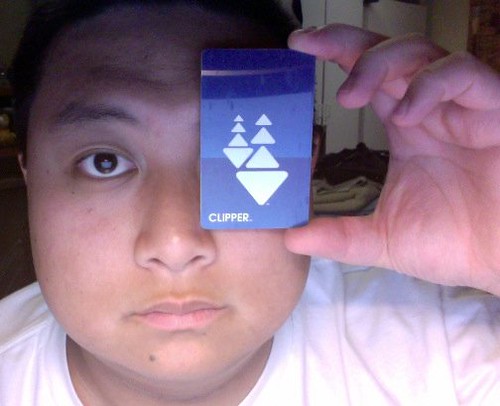
In light of the controversy over Muni's new equipment that makes it easy to fare evade (a.k.a. "GateGate") and the controversial 25 cent fee for limited use tickets at metro vending machines, there's a bright spot in all this mess.
Remember when I told you there was an easy way to not pay the 25 cent surcharge?
If you haven't been reading my blog lately, here's a shortened version...
The new Muni ticketing machines at metro stations sell paper limited use tickets and plastic Clipper cards. The paper version costs 25 cents each to issue and has heavy restrictions on usage (Muni only, up to two rides stored, and expires in 90 days). The plastic Clipper cards, which has far few restrictions, are FREE as long as the customer adds a minimum $2 to the card, pass, or some other transit media.
UPDATE: Muni has waived the 25 cent surcharge. --End of Update--
But to make the pot of honey just a little bit sweeter...
Clipper cards are now free until JUNE 2011! I'm not kidding folks.
(Verified by KGO news and SF Gate's "City Insider")
Clipper's plan was to give out the adult cards for a limited time. All youth and senior cards is issued free of charge (permanently). I'd expect the freebie cards to end sometime in the next month or two, but this extension is quite exciting. Once the free adult card program ends, the fee to obtain a card will be $5.
Now that you have been informed, never buy a paper limited use ticket! The plastic cards will continue to be sold at the machines for no surcharge for eight more months! If you are a citizen of the Bay Area, regardless if you ride transit daily or infrequently, why spend an extra quarter on a paper ticket when one plastic card will make-up its value in the long term?
Go ahead folks, tell your friends and those random tourists. Free cards for all!
5 comments:
Just tried to register a Clipper Card. Why do they require address and phone number for this? Even if I never intend to use autoload or add fare online?
The address and phone number helps verify you when speaking to customer service, plus if there's any big changes, they'll mail you information.
If you lose your card, they'll use the info you provided to mail you a new card.
BTW, Have you actually been able to enter Metro without waiting for the gates ahead of you to close before you can enter?
In my experience, the Clipper card is so slow, the person ahead is usually long gone and the gates have closed bfore my card is recognized.
Haven't done that yet. I don't ride the metro frequently enough to get the full experience.
Akit — Thanks for keeping up with this. Your observations and information are spot-on. In particular, I concur with your "who cares?" assessment of the fare gate evasion issue currently attracting sensationalized media attention. Muni has a lot of problems, but I'm convinced that sometimes they become their own worst enemy by displaying a lack of communication skills that only exacerbates their problems and degrades their public image through misinformation and misunderstanding. Mainstream media sensationalism along with poor investigation and reporting, of course, don't help.
Two cases in point:
(1) At least as reported in a poorly investigated Chronicle article, Nat Ford responded to the "glitch" in the fare gates that many are fixated on by mumbling something about "looking for a fix," when he should have just pointed out that Muni Metro has always been, and, by design, will always be a porous system that relies on proof of payment and random fare inspection. As such, of course, fare gates are not intended to prevent all evasion but rather to promote orderly station entry/exit, remind the honest majority that they are entering the fare-paid area, and provide a means for them to pay. Between the Metro system's necessarily barrier-free surface boarding with onboard tagging and low physical barriers in the stations — compare, for example, Chicago's prison-like, floor-to-ceiling barriers — there are many points of entry for would-be evaders.
(2) Then in the same article, Ford explained that they don't required "tagging out" at Metro stations (which much of the internet blather seems to believe would be an easy solution) simply to prevent bottlenecks. As you've pointed out, however, the bigger reason is that they're constrained from using a "tag in-tag out" system by the use of paper transfers on buses and Metro trains at surface stops. The cost of outfitting the entire Muni fleet with RFID ticket dispensers would (at present) probably be substantial and prohibitive.
As an aside, a comparison was made with London, which uses the same Cubic fare gates in parts of their underground. One difference that was pointed out was that in London they do require "tagging out," presumably sidestepping the Muni "fare gate glitch," and thus eliminating all fare evasion, right? Well, not exactly. Transport for London apparently has a policy of leaving fare gates wide open in un- or understaffed stations, to prevent bottlenecks. So how do they ensure fare payment (other than the honor system)? Simple — they deploy roving fare inspectors to check tickets and scan Oyster cards to verify that they were tagged on entry . Sound familiar?
None of this means there aren't substantive problems that Muni (MTC, Cubic, …) really do need to address with all possible speed to make this all work. Ubiquitous malfunctioning on-vehicle readers, too few TVMs at Powell (other stations too?), and woefully inadequate information dissemination and policy articulation all come to mind. And, of course, a "fix" for the fare gate "glitch," above comments notwithstanding, would be welcome as well.
Keep up the good work.
- Mark
Post a Comment